How Agile Consultants Drive Successful Transformations



The Agile Consulting market, valued at $27.6 billion in 2022, is projected to reach $142 billion by 2032, with a compound annual growth rate (CAGR) of 18.1% from 2023 to 2032. This growth is driven by the increasing demand for Agile practices mainly in technology, but also in finance, healthcare, and manufacturing.
However, organizations adopting Agile methodologies often struggle with cultural resistance, inconsistent practices across teams, and insufficient leadership participation, which can hinder the successful implementation of Agile methodologies. Moreover, only 1 in 10 organizations believe they have the necessary talents to fully support their Agile initiatives.
Agile consultants are specialized professionals who bring deep knowledge and experience in Agile methodologies to guide organizations through their transformation journeys. In this article, we will explore the role of Agile consultants, answering these questions:
- What are the key challenges in Agile Transformation that consultants can help navigate?
- Which are the main types of Agile Consultants?
- What specific traits should you look for in an Agile consultant?
- How do Agile consultants add value to the transformation process?
Definition of Agile Transformation Methodologies
Agile transformation methodologies are a strategic shift in project management and software development, designed to enhance flexibility and responsiveness. They differ substantially from traditional approaches:
- Management Style: Agile promotes leadership and collaboration within self-organizing teams, as opposed to a command-and-control approach.
- Knowledge Management: Agile relies on tacit knowledge, emphasizing informal, direct communication, whereas traditional methods often depend on explicit documentation.
- Development Model: Agile uses an evolutionary delivery model, where work is done in small, iterative cycles, allowing for continuous adjustment and improvement. This contrasts with a traditional life-cycle model, which moves sequentially through stages from planning to delivery.
- Organizational Structure: Agile thrives in organic, adaptable structures, typically within small to medium-sized teams, while traditional methods are suited to large, mechanistic organizations with well-defined hierarchies.
- Tools: Agile methodologies use modern tools like JIRA, Trello, Azure DevOps, and VersionOne to enable real-time collaboration and iterative workflows. In contrast, traditional methodologies like Waterfall, Critical Path Method (CPM), and PERT often rely on tools such as Microsoft Project, Gantt charts, and PERT charts, which emphasize upfront planning and track progress in a linear, sequential manner.
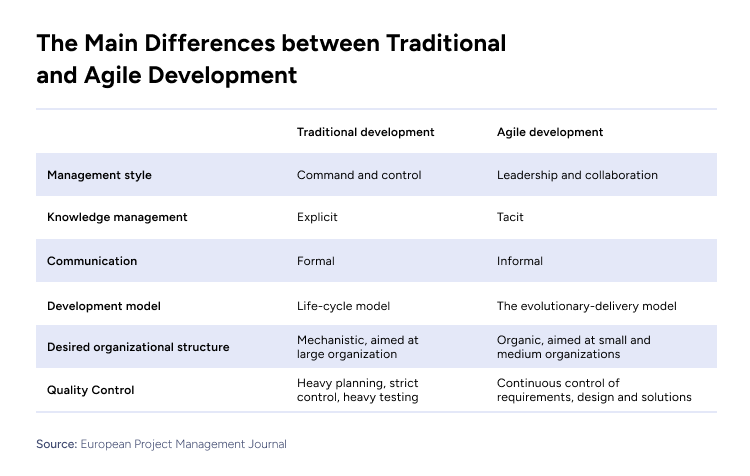
Since 2019, 81% of organizations reported an increased use of agile transformation methodologies, primarily valued for its ability to accelerate software delivery (71%) and enhance the ability to manage changing priorities (63%). Additionally, it increases productivity (51%) and improves business/IT alignment (47%), ensuring that projects are both efficient and aligned with business goals.

Main Challenges when Adopting and Scaling Agile Methodologies
Adopting and scaling Agile methodologies presents three main challenges for organizations:
- Cultural Resistance: 48% of companies identify it as a major obstacle. Overcoming this challenge requires a shift from traditional, hierarchical structures to a culture that values transparency, collaboration, and continuous improvement.
- Leadership participation: 46% of organizations citing insufficient leadership involvement as a key barrier to successful Agile Transformation. Effective leadership is essential for providing strategic direction and ensuring that Agile practices are applied consistently across all teams.
- Inconsistent processes and practices across teams pose a substantial challenge, affecting 45% of organizations. Standardizing Agile practices through comprehensive training, clear guidelines, and regular reviews are crucial to maintaining alignment and reducing friction within the organization.
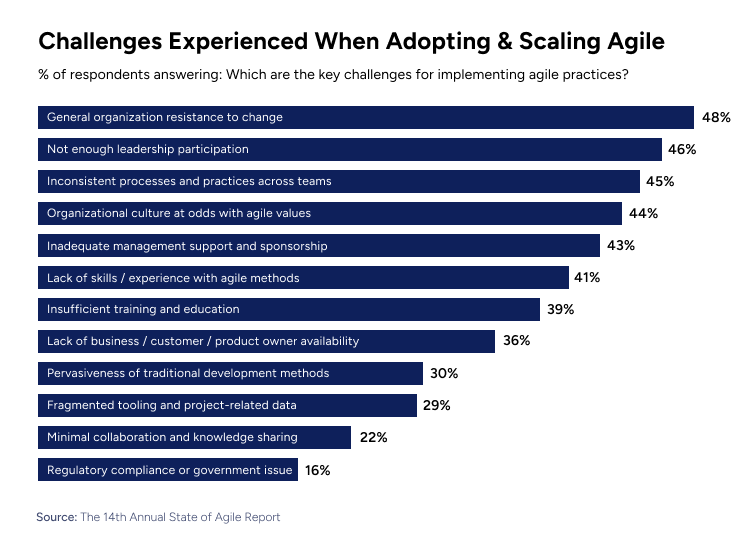
These challenges show the complexity of Agile Transformation and the need for a well-coordinated approach that addresses cultural, leadership, and process-related barriers. Here is where Agile consultants can provide critical support, guiding organizations through these challenges and ensuring a successful transformation.
The Role of Agile Consultants
According to a survey conducted by KPMG, less than 15% of companies believe their employees are ready for an Agile transition. This highlights a significant gap in readiness for Agile Transformation. The shortage of resources with sufficient Agile experience and the need for continuous training further complicate this readiness.
Agile consultants are critical in bridging this gap. They provide the necessary expertise to guide companies through Agile adoption, offering coaching, building employee capabilities, and fostering a culture that supports Agile practices.
Currently, over 70% of Agile consultants are engaged in the technology and the financial industries. However, their expertise is not limited to IT. In fact, they are also expanding their services into non-IT industries such as healthcare or manufacturing.
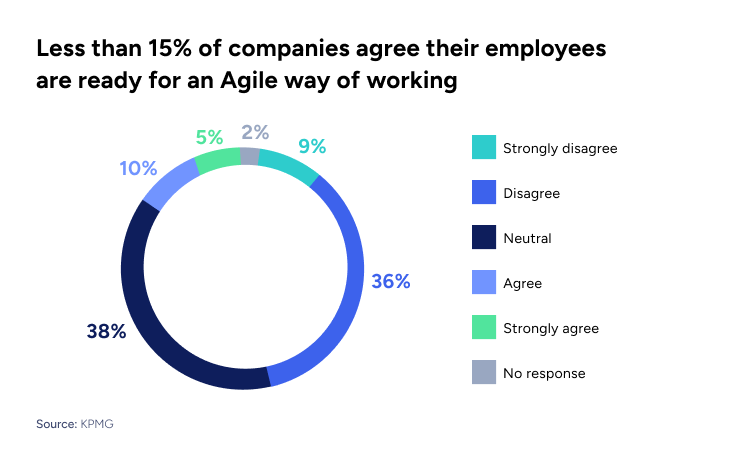
Agile consultants can be classified depending on their specific role and specialization: Transformation Managers, Agile Transformation Consultants, Agile Project Managers, Scrum Masters, and Agile Coaches.
Transformation Managers

Transformation Managers are leaders responsible for overseeing and executing large-scale change initiatives within an organization. They ensure that the transformation aligns with the company’s strategic goals and is implemented across all departments effectively. They bring expertise in business strategy, change management, and Agile methodologies, with a strong background in leadership roles.
Furthermore, they are essential for large-scale, enterprise-wide Agile transformations that require strategic alignment with business objectives. For instance, if a corporation is shifting from a traditional hierarchical structure to an Agile model across multiple business units, a Transformation Manager ensures that each unit aligns with the overall strategic vision, managing resistance and minimizing disruptions throughout the organization.
Agile Transformation Consultants

Agile Transformation Consultants are specialists in implementing Agile methodologies across an organization. They focus on transitioning teams and departments from traditional project management methods to Agile practices. These consultants have a strong experience in various Agile frameworks such as Scrum, Kanban, and SAFe (Scaled Agile Framework). Their role often includes assessing current processes, identifying areas for improvement, and designing a roadmap for the Agile transition.
Clients should hire Agile Transformation Consultants when they need to transition specific departments or the entire organization to Agile methodologies. For instance, if a company’s IT department is moving from a Waterfall to an Agile approach, an Agile Transformation Consultant would be critical in designing the transformation roadmap.
Agile Project Managers

Agile Project Managers are responsible for managing projects that utilize Agile methodologies. Unlike traditional project managers, Agile Project Managers focus on facilitating iterative development, ensuring that teams are working effectively within Agile frameworks. They are skilled in sprint planning, backlog management, and coordinating cross-functional teams to deliver project goals incrementally.
They are ideal for projects where Agile practices are already in place, and the focus is on managing the process to ensure timely delivery and high-quality output. For example, when launching a new software product, an Agile Project Manager is ensuring that the development team adheres to Agile principles, manages the product backlog effectively, and delivers features in a series of sprints.
Scrum Masters

The term “scrum” comes from rugby, where it refers to a formation of players that work together to gain possession of the ball. Similarly, in Agile, the Scrum team works collaboratively to achieve the project goals. "Scrum" refers to a framework used to implement Agile practices, focusing on delivering small, incremental updates to a product or project, with a Product Owner, a Development Team, and, indeed, a Scrum Master.
Scrum Masters are dedicated facilitators within these teams, responsible for ensuring that the Scrum framework is followed correctly. They are experts in Scrum processes and serve as coaches to the team, helping to remove road blockers to success. Scrum Masters conduct daily stand-ups, sprint reviews, and retrospectives, ensuring that the team stays focused on delivering value.Clients should hire Scrum Masters to streamline transitions to Scrum methodologies, particularly in environments where teams are new to Scrum or need ongoing support to maintain discipline. A Scrum Master is essential to facilitate sprints planning, daily scrum, sprint review, help the team adhere to Scrum practices, and remove any blockers that could delay progress.
Agile Coaches

Agile Coaches are mentoring and guiding organizations in adopting agile methodologies at both the team and enterprise levels. They have deep expertise in Agile frameworks and are skilled in fostering a new agile corporate culture. Agile Coaches work across multiple teams to build Agile capabilities, focusing on long-term organizational change, helping teams to become self-sufficient in their Agile practices.
Clients should engage Agile Coaches when they need to embed Agile practices deeply into the organization’s culture. For example, if an organization is undergoing a broad Agile transformation across multiple departments, an Agile Coach would provide the necessary training, mentorship, and support. They are also valuable for organizations that have implemented Agile but are looking to enhance their practices and achieve higher levels of maturity.
3 Traits to Look For in an Agile Transformation Consultant
1. Certifications and Recognized Qualifications
Hiring a consultant with qualified certifications is a significant value-add for any organization undergoing an agile transformation. The 3 main agile qualifications are as follows:
- Certified ScrumMaster (CSM): A CSM certification indicates proficiency in leading teams through Scrum processes, a framework adopted by 58% of organizations. This certification ensures that teams fully understand and adhere to the Scrum framework, resulting in more efficient sprint planning and delivery. CSM-certified consultants are skilled at facilitating daily stand-ups, managing sprint reviews, resolving blockers quickly, and enhancing team communication and collaboration.
- Certified Scrum Professional (CSP): CSP consultants bring advanced expertise in optimizing Scrum processes to meet specific business needs. They mentor teams to improve sprint velocity and deeply integrate Agile practices within the organization. CSP-certified consultants focus on aligning Scrum activities with strategic business goals, ensuring that projects meet deadlines and deliver measurable business value.
- Scaled Agile Framework (SAFe) Program Consultant (SPC): Organizations employing SAFe-certified consultants see a 30% improvement in project delivery times. SPC-certified consultants implement SAFe practices that ensure consistent Agile adoption across the enterprise. They are also qualified to train internal staff on SAFe, build lasting Agile capabilities, and align these practices with portfolio management.
Companies’ needs are evolving, and experienced consultants can help navigate agile transitions. As reported by the 14th Annual State of Agile Report, 9% of respondents reported using hybrid methodologies that combine multiple agile frameworks, while another 10% used ScrumBan, a combination of Scrum and Kanban. However, this percentage is forecasted to rise, especially for large-scale transformation projects.
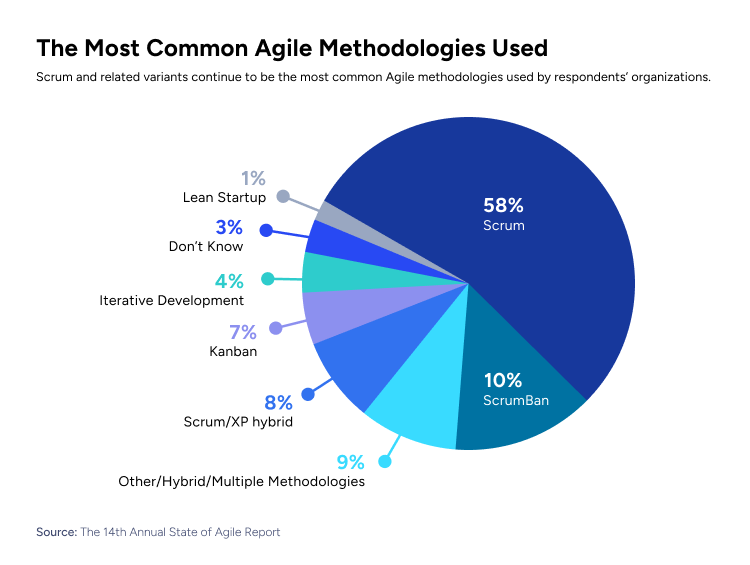
2. Expertise in Agile Tooling: JIRA, DevOps
Agile tools streamline project management by improving task tracking and real-time collaboration, enabling teams to respond quickly to changes. They support seamless integration with other tools, which enhances the efficiency of development and delivery processes.
The most commonly used Agile tools are JIRA and DevOps:
- JIRA is a project management tool tailored for Agile teams, enabling precise tracking of tasks, sprint planning, and backlog management. Its robust real-time reporting capabilities offer detailed insights into team performance, helping identify bottlenecks early and facilitating quick resolution. JIRA’s ability to integrate with various development tools makes it a critical component for CI/CD pipelines, ensuring that development, testing, and deployment processes are streamlined and efficient.
- Azure DevOps is a comprehensive tool set that supports the entire software development lifecycle, making it particularly valuable for enterprises using Microsoft technologies. As JIRA, Azure DevOps stands out for its strong CI/CD capabilities, which help teams automate the deployment process, reduce errors, and accelerate software delivery.
JIRA is the most widespread tool, used by 67% of organizations implementing agile methodologies. However, the use of DevOps is increasing, with 76% of organizations stating that they currently are developing DevOps initiatives, and 43% said DevOps was extremely important for agile transformation.
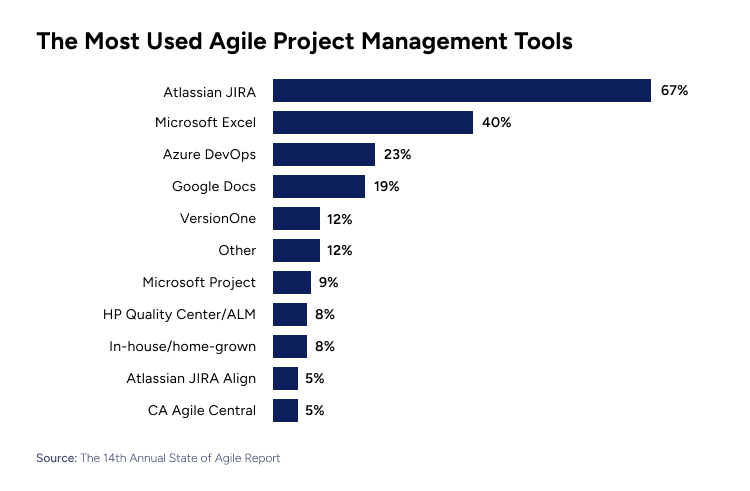
3. Leadership and Communication Skills: Driving Cultural Change
As already noted, general organizational resistance to change is one of the most influential challenges for Agile Transformation success. Thus, effective leadership and communication are crucial for driving the cultural change necessary for a successful Agile Transformation.
Agile consultants must possess strong leadership skills to articulate a clear vision for the transformation and ensure that it is communicated effectively across all levels of the organization. This is particularly critical, as improving business agility is often a top-down decision, with 71% of respondents indicating that these changes are driven primarily by leadership.
According to Deloitte, 47% of organizations identified leadership commitment as a critical factor in the success of their agile transformation.Consultants who excel in leadership can articulate a clear vision, motivate teams, and foster a culture of collaboration and continuous improvement.
Effective communication is also essential in overcoming resistance to change. A consultant who can communicate the benefits of agile in a way that resonates with all levels of the organization is more likely to secure buy-in from stakeholders. This buy-in is crucial for sustaining long-term change, as it ensures that the entire organization is aligned with the agile principles and committed to the transformation process.

Consultport Case Study: Agile Transformation Consultant for US Insurance Corporate
The Challenge and Project Requirements
A US-based insurance corporation faced the challenge of transitioning from a traditional Waterfall methodology to full Agile practices. This transition was critical as the existing team had limited experience with Agile, and the company had only one Scrum Master, which was inadequate for the scale of the transformation required.
The organization needed an Agile Transformation Consultant with a proven track record in managing large-scale corporate Agile transformations. The consultant was required to have in-depth knowledge of the SAFe 6.0 framework and the ability to lead the transition establishing cross-functional challenges. Additionally, the consultant needed to provide hands-on coaching and be capable of fostering a cultural shift within the IT department to fully embrace Agile methodologies.
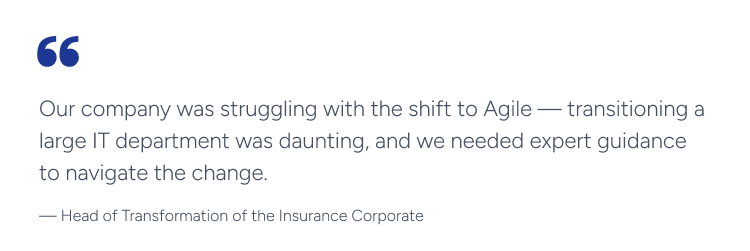
Role of Consultport
Consultport was engaged to find a suitable consultant who could meet the project’s specific demands within a tight timeframe. Within 48 hours, Consultport proposed two highly qualified consultants. The client ultimately selected a former Deloitte consultant with over 15 years of experience in leading Agile transformations for large financial services organizations.
This consultant was a Certified SAFe Program Consultant (SPC) and held an Agile Coach certification, making them exceptionally well-equipped to drive the transformation. The consultant's experience in both Agile and financial services was crucial in understanding the unique challenges faced by the insurance corporation and in aligning the transformation with the organization’s strategic goals.
Approach
The consultant took a structured and phased approach to the Agile transformation, beginning with a comprehensive assessment of the current IT processes. This assessment identified areas where Agile practices could be most effectively introduced.
Over a 12-month period, the consultant implemented the transformation plan in stages, starting with leadership and team training to ensure a solid understanding of Agile principles and the SAFe 6.0 framework. The consultant established dedicated cross-functional Agile teams, introduced essential tools such as JIRA for project management, and implemented continuous integration systems to streamline workflows.
To ensure sustained progress, the consultant provided regular coaching sessions, which helped maintain momentum and address any challenges that emerged during the transition. Additionally, the consultant facilitated workshops and retrospectives, ensuring that lessons learned were incorporated into the ongoing transformation.
Results

The Agile Transformation led to remarkable improvements in the IT department’s efficiency and effectiveness. The project led to:
- 30% improvement in project delivery time.
- 25% increase in alignment between IT outputs and business objectives.
- 20% increase in Customer satisfaction.
Moreover, by choosing to hire a freelance Agile consultant through Consultport, the company realized a cost saving of approximately 40% compared to the expenses associated with hiring a traditional consulting firm.

Conclusion
In conclusion, Agile Transformation is essential for organizations aiming to thrive in a dynamic business environment. However, the journey from traditional methodologies to Agile practices is fraught with challenges that require expert guidance.
Agile consultants provide this guidance, helping organizations overcome cultural resistance, align processes, and achieve their strategic objectives. By leveraging the expertise of Agile consultants, companies can ensure a smoother, more effective transformation, ultimately leading to improved efficiency, customer satisfaction, and business performance.

Rajesh is an agile project manager and a scrum master with experience in industries in the logistics and transportation industry. He guides cross-functional teams to deliver complex projects on time and within budget. Multiple times, Rajesh has implemented Agile practices in software development projects, reducing delivery time and improving team’s agility to adapt to changing environments.
on a weekly basis.


